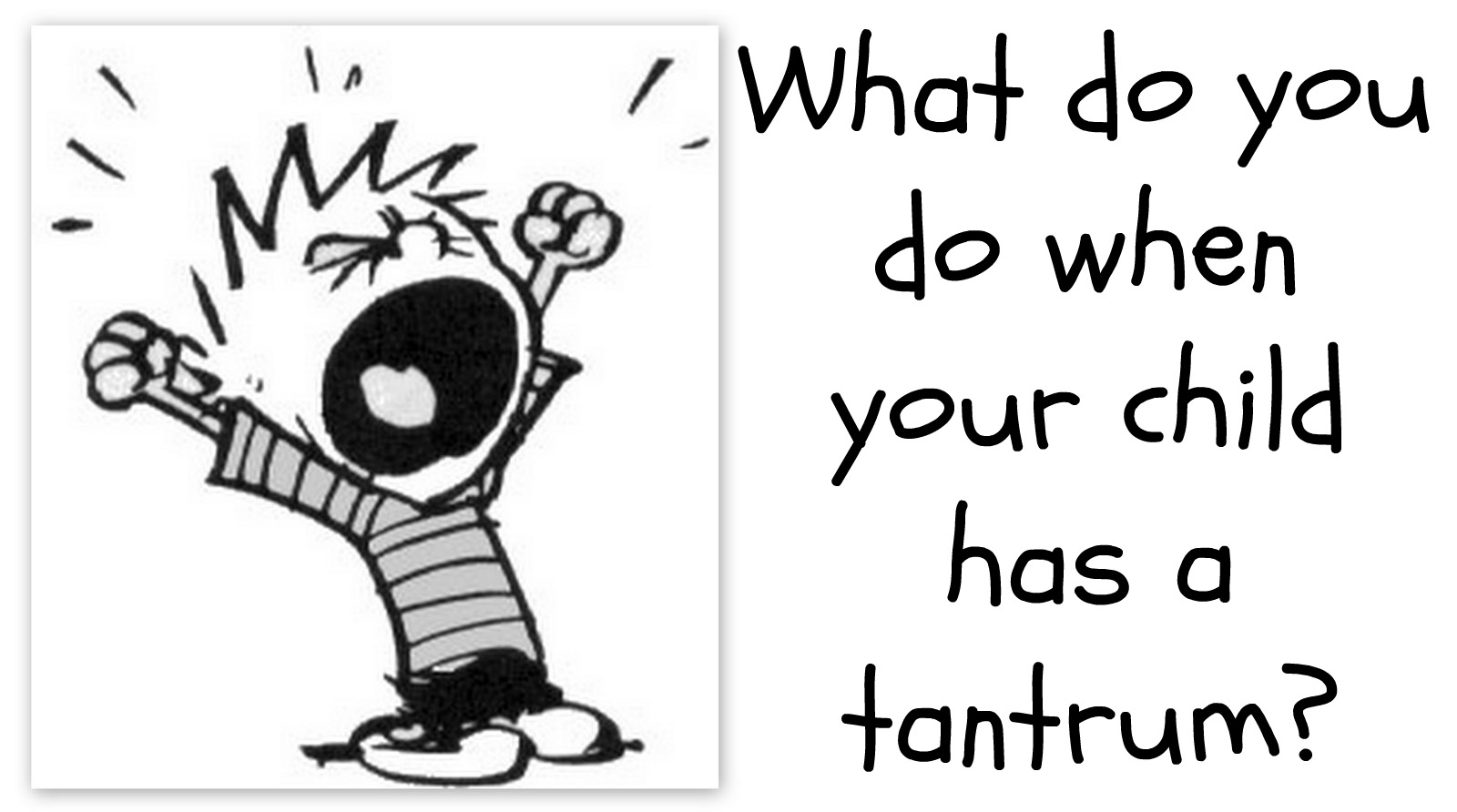By Contributor Pamela Chan
If you’re a parent of young children, chances are you have searched the Internet as you work out the best approach to take during a tantrum. Or perhaps you did what I did and scanned a medical book lying about in the pediatrician’s office. Surely if the book is there, the advice inside must be solid.
Some specialists will say that overly permissive parents and strict parents often have children who have frequent tantrums. I’m not sure that I believe that statement. Others discuss findings outlined in the book the Whole Brain Child. During a tantrum the child’s right brain, focussed on emotion and feelings, dominates the left brain, that is focussed on logic and order. This makes more sense to me.
“During those early years, the ability to coordinate and balance your own sub cortical source of emotion is dependent on a caregiver’s response to you. We freak out, they freak out. Our ability to stay tuned in to them literally helps their brains grow. With repeated patterns of attuned communication – bringing them close – basically it activates the pre-frontal area that will start growing, so that what was regulation of emotion dependent on another person, becomes more autonomous. We call that self regulation.” (Dr. Dan Siegal, Whole Brain Child)
Ultimately in our family we had to come up with our own strategies to ride out a tantrum when one appears – often unexpectedly.
The Looks
Once, while spending time responding to my child’s tantrum in the parking lot (with me standing by the open door of the car), I saw a woman chatting on her phone. She kept looking at us and laughing as she continued. Granted she could have been multi-tasking – watching us while having a completely different conversation. My sense told me it was what I suspected. She was having a joke with her friend at our expense. There is only one thing to do in that circumstance – glance in the person’s direction and look at the space between the person’s eyebrows. You’re not looking at their eyes directly but the message has been delivered that you’re on to them.
Then I return to the task at hand.
The Escape
For my child’s privacy and for my own sanity, I always leave the scene where the tantrum started. Calmly and without commenting to the child, I pick up the child and go to a quiet hallway or somewhere where people are not. This way if my child needs to continue to be upset, I don’t have to worry about people feeling put out by the inconvenience of it all.
The Elevator
When a child’s emotions go up, I internally push my emotions down. If I react to raised emotions by raising my own I will not be in any position to calmly and clearly attend to the situation. I find that once adults have done this a few times they realize that it is possible.
Watch the Tone
At the same time that I calm myself down internally, I have to watch my tone, the volume of my voice and the choice of my words. If I want my child to see that I am calm, all of these actions work together in harmony.
Watch the Body Language
Body language reflects feelings and goes hand-in-hand with my words and tone. I avoid tugging at my child, making sudden movements, throwing up my hands, pointing my fingers and crossing your arms.
Stay Close
I never leave a child who is having a tantrum alone in a room or space. I make sure that my child is in a safe place (Eg where there are no sharp corners) and stay very close to monitor as she/he comes back to a calmer state.
Express Understanding
Although not much active hearing is going at the peak of a tantrum I can still say “I hear you. You want….”.
Practice Breathing in Advance
Not all children will respond to this but it can help to practice breathing in and then taking long breathes out when a child is not experiencing a tantrum. It might be possible to encourage this type of response as a child is coming out of the peak of a tantrum. It depends on the child.
Offer a Hug
“Many of the tantrums have a period of pretty intense peak anger relatively early and as that dissipates, there’s more comfort-seeking and sadness.” (James Green, Researcher, University of Connecticut)
Children can feel separated from the adult as a tantrum progresses. At some point, as they start to come down from the peak of a tantrum, I can ask “do you need a hug”?
Don’t Feel Rushed
I don’t let other people tell me that I need to stop a tantrum (which I can’t do) because other people are being inconvenienced. Unless I am in their way and blocking their movements, or I insist on staying in a quieter setting when I could move to another area, I allow my child the time needed to move through the tantrum cycle.
Admit Limitations
There are times when a tantrum has started as a result of a a conflict of plans between my child and me. It has been intense and the result can be a reaction that is a few notches down from a tantrum but is equally challenging. If I’m not feeling well or I’m tired, and if my husband is nearby, I will ask him to take over because I know I’m not in the best place to do what I need to do.
The choices that we make as to how we respond to a child’s tantrum support his/her self-regulation of their developing emotional responses. Children also learn about how others respond to situations in a calm manner. If you’ve ever heard someone discuss the impact of growing up with a highly strung or over reactive parent, you will know the importance that this modeling of emotional responses has on children.
It’s sad to see that one of the most popular categories of videos parents upload of their children is about tantrums. No doubt we all have had a few tantrums in our lives. Don’t children deserve privacy and understanding as they learn how to respond to situations that aren’t what they like or anticipated?
Related
Overview of 12 Whole Brain Ideas
Pamela Chan lives in the Tri Cities area near Vancouver with her husband and four year old twins. They enjoy exploring cultural events and scenic local parks. On BCfamily.ca she writes about ideas ideas that strengthen our communities and celebr










16 Comments on “What to Do When Your Child Has a Tantrum?”
Great post!
These are really excellent tips. I follow a similar strategy with my girls. Thankfully tantrums are few and far between. I think the No. 1 most important thing is for the parent to remain calm.
excellent tips, I hated when my girls had their tantrums and it was usually in the store
That is really great advise. It is easy to rise to the occasion with negative emotions, and keeping control of oneself is so important.
Love your tips as i am in the midst of toddler tantrums with my daughter at the moment and any help is appreciated!
Thank you for the tips. I am entering the phase of tantrums (in public places) and dreading it knowing the DNA this child shares with me. LOL! Thanks again!
really love these tips! I always try to keep in mind that just because my child does something ‘bad’, doesnt make my toddler bad. He is overall a good child.
I’ve never had to deal with a tantrum…..yet. Eventually, I think my baby girl might be “that kid” lol
Enjoyed reading this post!
I find with my youngest he will stay calm or calm down if you read him a book. I started keeping a couple books in the diaper bag so if he starts acting up on the bus I can just give him a book. if it doesn’t stop I will have to read it to him but he is usually ok just flipping pages by himself.
my oldest is usually ok or will just whine quietly instead of making a scene
I think your reaction to tantrums is a sensible one. Your child does not become humiliated by expressing feeling which he/she may not be able to control just yet and your calmness helps to calm them as well.
Great tips.
I think you have a very common sense response to tantrums. I also think they are born of frustration on the child’s part. I also agree with you that, if possible, the parent should remain as calm and serene as possible under the circumstances. I have seen children who had tantrums, when young, grow up into very self-disciplined adults. This is your child. You know better than anyone what is possibly needed at that time.
Great reminders on how to deal. We are venturing a little close to tantrums lately…I see how some other folks handle things with there kids, sure makes you think.
Thanks for posting this,I hope everyone who has children/grandchildren read this
Trying to understand my children’s tantrums and how to deal with it. I admit I lose my cool a lot and I don’t remain calm all the time and sometimes I laugh or ignore them while this happens. I know I know not the right thing but I a a single mom and I do the best I can. I have let them have to much freedom and now I have had a wake up call and see this is only gonna get worse unless I start putting my foot down
And keep it down. I get exhausted and try to escape for a couple deep breaths and that I can not even do with out her kicking the door. Yes I hug and love her when I can get close enough to her but that is normally an hour later. I know she is needing something and she won’t say what but I also know she will talk when it’s right for her. Any advice is welcomed.
I have to admit that my observing of tantrums seems to be in families where the parent is very permissive and then, when they demand obedience, the child rebels against the parent.
I have seen tantrums in strong-willed children in families where the parents are reasonable and consistent. Again, calmness, privacy and firmness usually bring a quick and quiet resolution.
Most children that I have observed in the second paragraph have grown up to be self-disciplined and reasonable adults. The jury is still out on some in the first paragraph.